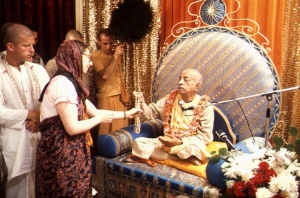SB 6.11.21: Difference between revisions
m (1 revision(s)) |
No edit summary |
||
| Line 1: | Line 1: | ||
{{info | {{info | ||
|speaker= | |speaker=Vṛtrāsura | ||
|listener=Demigod King Indra | |listener=Demigod King Indra | ||
}} | }} | ||
[[Category:Srimad-Bhagavatam - Canto 06 Chapter 11]] | |||
[[Category:Bhagavatam Verses Spoken by Vrtrasura - Vanisource|061121]] | |||
<div style="float:left">'''[[Srimad-Bhagavatam]] - [[SB 6|Sixth Canto]] - [[SB 6.11: The Transcendental Qualities of Vrtrasura|Chapter 11: The Transcendental Qualities of Vṛtrāsura]]'''</div> | |||
<div style="float:right">[[File:Go-previous.png|link=SB 6.11.20]] '''[[SB 6.11.20]] - [[SB 6.11.22]]''' [[File:Go-next.png|link=SB 6.11.22]]</div> | |||
{{RandomImage}} | |||
==== TEXT 21 ==== | ==== TEXT 21 ==== | ||
<div class="verse"> | |||
<div | :ahaṁ samādhāya mano yathāha naḥ | ||
ahaṁ samādhāya mano yathāha naḥ | :saṅkarṣaṇas tac-caraṇāravinde | ||
saṅkarṣaṇas tac-caraṇāravinde | :tvad-vajra-raṁho-lulita-grāmya-pāśo | ||
tvad-vajra-raṁho-lulita-grāmya-pāśo | :gatiṁ muner yāmy apaviddha-lokaḥ | ||
gatiṁ muner yāmy apaviddha-lokaḥ | |||
</div> | </div> | ||
| Line 17: | Line 22: | ||
==== SYNONYMS ==== | ==== SYNONYMS ==== | ||
<div class="synonyms"> | |||
<div | ''aham''—I; ''samādhāya''—fixing firmly; ''manaḥ''—the mind; ''yathā''—just as; ''āha''—said; ''naḥ''—our; ''saṅkarṣaṇaḥ''—Lord Saṅkarṣaṇa; ''tat-caraṇa-aravinde''—at His lotus feet; ''tvat-vajra''—of your thunderbolt; ''raṁhaḥ''—by the force; ''lulita''—torn; ''grāmya''—of material attachment; ''pāśaḥ''—the rope; ''gatim''—the destination; ''muneḥ''—of Nārada Muni and other devotees; ''yāmi''—I shall achieve; ''apaviddha''—giving up; ''lokaḥ''—this material world (where one desires all kinds of impermanent things). | ||
</div> | </div> | ||
| Line 25: | Line 29: | ||
==== TRANSLATION ==== | ==== TRANSLATION ==== | ||
<div class="translation"> | |||
<div | |||
By the force of your thunderbolt, I shall be freed of material bondage and shall give up this body and this world of material desires. Fixing my mind upon the lotus feet of Lord Saṅkarṣaṇa, I shall attain the destination of such great sages as Nārada Muni, just as Lord Saṅkarṣaṇa has said. | By the force of your thunderbolt, I shall be freed of material bondage and shall give up this body and this world of material desires. Fixing my mind upon the lotus feet of Lord Saṅkarṣaṇa, I shall attain the destination of such great sages as Nārada Muni, just as Lord Saṅkarṣaṇa has said. | ||
</div> | </div> | ||
| Line 32: | Line 35: | ||
==== PURPORT ==== | ==== PURPORT ==== | ||
<div class="purport"> | |||
The words ''ahaṁ samādhāya manaḥ'' indicate that the most important duty at the time of death is to concentrate one's mind. If one can fix his mind on the lotus feet of Kṛṣṇa, Viṣṇu, Saṅkarṣaṇa or any Viṣṇu ''mūrti'', his life will be successful. To be killed while fixing his mind at the lotus feet of Saṅkarṣaṇa, Vṛtrāsura asked Indra to release his ''vajra'', or thunderbolt. He was destined to be killed by the thunderbolt given by Lord Viṣṇu; there was no question of its being baffled. Therefore Vṛtrāsura requested Indra to release the thunderbolt immediately, and he prepared himself by fixing his mind at the lotus feet of Kṛṣṇa. A devotee is always ready to give up his material body, which is described herein as ''grāmya-pāśa'', the rope of material attachment. The body is not at all good; it is simply a cause of bondage to the material world. Unfortunately, even though the body is destined for destruction, fools and rascals invest all their faith in the body and are never eager to return home, back to Godhead. | |||
</div> | |||
<div | <div style="float:right; clear:both;">[[File:Go-previous.png|link=SB 6.11.20]] '''[[SB 6.11.20]] - [[SB 6.11.22]]''' [[File:Go-next.png|link=SB 6.11.22]]</div> | ||
__NOTOC__ | |||
</div> | __NOEDITSECTION__ | ||
__NOTOC__ | |||
Revision as of 14:24, 13 May 2021

A.C. Bhaktivedanta Swami Prabhupada
TEXT 21
- ahaṁ samādhāya mano yathāha naḥ
- saṅkarṣaṇas tac-caraṇāravinde
- tvad-vajra-raṁho-lulita-grāmya-pāśo
- gatiṁ muner yāmy apaviddha-lokaḥ
SYNONYMS
aham—I; samādhāya—fixing firmly; manaḥ—the mind; yathā—just as; āha—said; naḥ—our; saṅkarṣaṇaḥ—Lord Saṅkarṣaṇa; tat-caraṇa-aravinde—at His lotus feet; tvat-vajra—of your thunderbolt; raṁhaḥ—by the force; lulita—torn; grāmya—of material attachment; pāśaḥ—the rope; gatim—the destination; muneḥ—of Nārada Muni and other devotees; yāmi—I shall achieve; apaviddha—giving up; lokaḥ—this material world (where one desires all kinds of impermanent things).
TRANSLATION
By the force of your thunderbolt, I shall be freed of material bondage and shall give up this body and this world of material desires. Fixing my mind upon the lotus feet of Lord Saṅkarṣaṇa, I shall attain the destination of such great sages as Nārada Muni, just as Lord Saṅkarṣaṇa has said.
PURPORT
The words ahaṁ samādhāya manaḥ indicate that the most important duty at the time of death is to concentrate one's mind. If one can fix his mind on the lotus feet of Kṛṣṇa, Viṣṇu, Saṅkarṣaṇa or any Viṣṇu mūrti, his life will be successful. To be killed while fixing his mind at the lotus feet of Saṅkarṣaṇa, Vṛtrāsura asked Indra to release his vajra, or thunderbolt. He was destined to be killed by the thunderbolt given by Lord Viṣṇu; there was no question of its being baffled. Therefore Vṛtrāsura requested Indra to release the thunderbolt immediately, and he prepared himself by fixing his mind at the lotus feet of Kṛṣṇa. A devotee is always ready to give up his material body, which is described herein as grāmya-pāśa, the rope of material attachment. The body is not at all good; it is simply a cause of bondage to the material world. Unfortunately, even though the body is destined for destruction, fools and rascals invest all their faith in the body and are never eager to return home, back to Godhead.